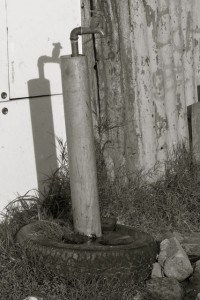I’ve been mulling over a story from Genesis 26 lately. Abraham just died, Esau sold his birthright, and because of famine, Isaac went to hang out with the Philistines in Gerar, since the Lord told him not to go to Egypt. After being tricksy with Abimelech about Rebekah being his wife, Abimelech tells everybody to leave him alone. He starts farming and does well for himself, and the Philistines get a lil’ jealous.
Isaac moves into the Valley of Gerar, where his father, Abraham, had dug wells years before, but the Philistines had stopped them up with dirt. Sorry, but I don’t know why. He digs those old wells again, and calls them what his father called them. He is tapping into a life source that someone dug before him — enjoying the benefits of the labor of others.
 He digs another well (since he’s been rolling in the crops and has lots of lifestock and servants, he probably needs lots of water.) The Philistines begin to argue with him about it. So he digs another and they fight over that one, too. Finally he digs another and there isn’t a squabble, so he sees it as a sign that the Lord has made room for him, and that he’ll be successful in the land. (He names the well Rehoboth, meaning spaciousness.)
He digs another well (since he’s been rolling in the crops and has lots of lifestock and servants, he probably needs lots of water.) The Philistines begin to argue with him about it. So he digs another and they fight over that one, too. Finally he digs another and there isn’t a squabble, so he sees it as a sign that the Lord has made room for him, and that he’ll be successful in the land. (He names the well Rehoboth, meaning spaciousness.)
As I seem to find with just about any passage of Scripture, there are a million lessons to be learned from lending some deeper thoughtfulness to this story, but one has been particularly near my heart for the past wee while. The lesson: Sometimes, you’re gonna have to learn to dig your own wells.
You see, back in the day, Isaac had enjoyed the benefits of the wells dug by his father. First, when he was with his father, he would’ve gotten water at his father’s wells. Then he enjoyed the fruit of his father’s work by re-digging wells his father had left behind. Although I’ve never dug a well before, my guess is re-digging one that’s been stopped up, where the infrastructure is already there and you know you’ll probably find water if you just keep digging, is a lot easier than digging a new one.
One important thing to recognise is that these wells are symbolic of life, a source of life, the potential for abundance and prosperity, the hope that goodness and more life are to come.
And we, you and I, often drink from wells someone else has dug.
Unless you founded the church you attend each week and you preach every sermon and lead every song, the encouragement and life you receive at that source on Sunday mornings is a well someone else dug for you.
The devotional books you read, the inspiring praise and worship music you might sing or play or listen to, even the Bible that you read and study — these are sources of life, wells, that someone else has dug for you.
They are very good and important, but it is also important to recognise that sometimes we need to dig our own wells. This might not necessarily mean you’re called to plant a new church right now or that you should be trying to write another Bible.
Uh…don’t do that. Please.
But it does mean you might be called to start a new small group or to forge a new gathering with your neighbours or co-workers. It could mean you need to dig by giving more attention to the Word and prayer in personal time with the Lord. It could mean you should be pursuing friendship or mentorship, so that you can be a source of life to others, and they in return to you.
{Getting personal} Starting out in a new place and a new season, I have done a poor job of digging wells of relationship to pour into and be poured into by the people around me. But recognising is sometimes half the battle: I still have time, and the ability to dig in the days ahead.
As the story continues, when Isaac left Rehoboth, he travelled up to Beersheba, and the Lord met him there. The Lord reiterated the covenant he’d made with Abraham to Isaac: “I’m the God of your father Abraham; don’t be scared, I’m with you. I’ll bless you and multiply your descendants for Abraham’s sake.” In response, Isaac built an altar to worship the Lord there. He pitched his tent, and, guess what?
He dug a well.
In partnership with the covenant promise of God, Isaac did his part to make way for the life he’d been promised: he dug another well.
What’s happening in your life? What do you see that you’re not happy about? Where do you see room for improvement?
The Sermon in a Nutshell: If you are feeling dry or tired, weary or discouraged in this season, I encourage you to consider whether there’s a well missing in your life. It might be the right time for you to grab a shovel and start digging.

 I create resources to help people find deeper, more meaningful relationships with God through pursuing, pondering, and prayer. The "Shop" link above will take you to the home of many of the lovely resources I’ve created to help you keep walking one day deeper with Jesus.
I create resources to help people find deeper, more meaningful relationships with God through pursuing, pondering, and prayer. The "Shop" link above will take you to the home of many of the lovely resources I’ve created to help you keep walking one day deeper with Jesus.
Great post! I must say I enjoy the relative ease and comfort of using wells that someone else has dug for me. Realizing that I’ll soon be leaving my security blanket of already made wells and the well diggers has me feeling quite overwhelmed as of late. It’s good for me to remember what God said to Isaac about not being scared and that HE is with me! Thanks for the much needed encouragement. (and congrats on baby #2!)
I am glad it was encouraging Jonna. I hope you’ll share more of your journey with me as things progress!
At first, I thought you were talking about a real well! Blonde moment. The encouragement is appreciated. Thanks
Deb